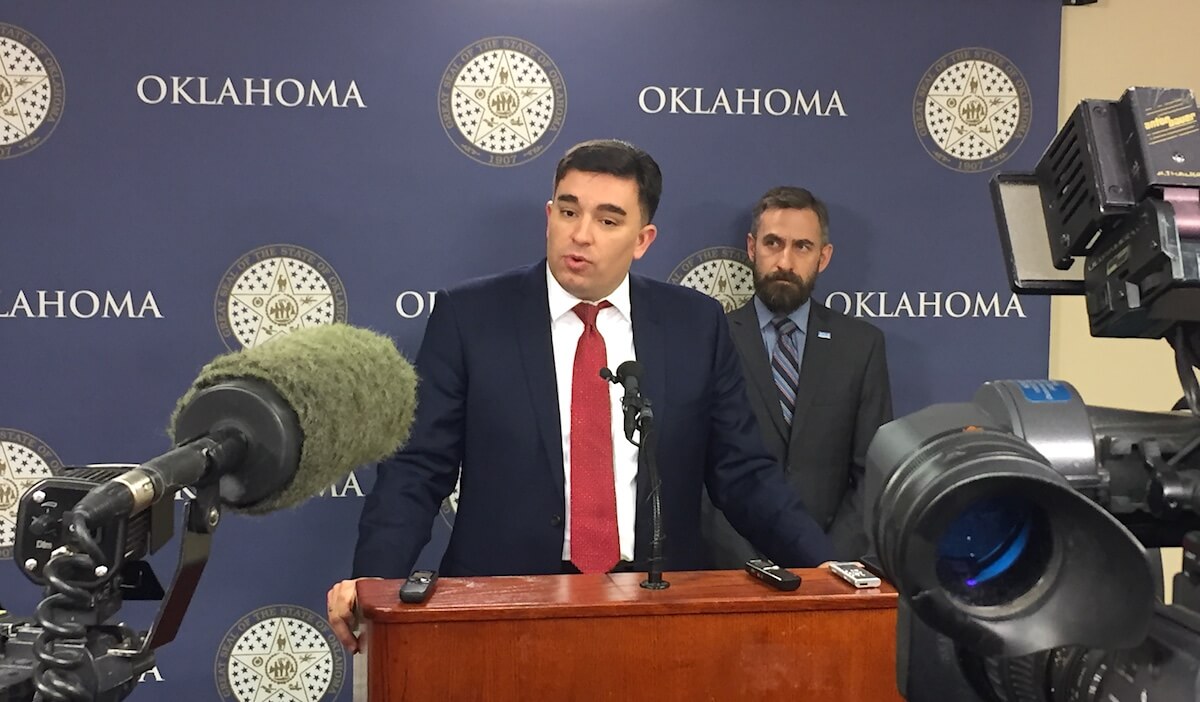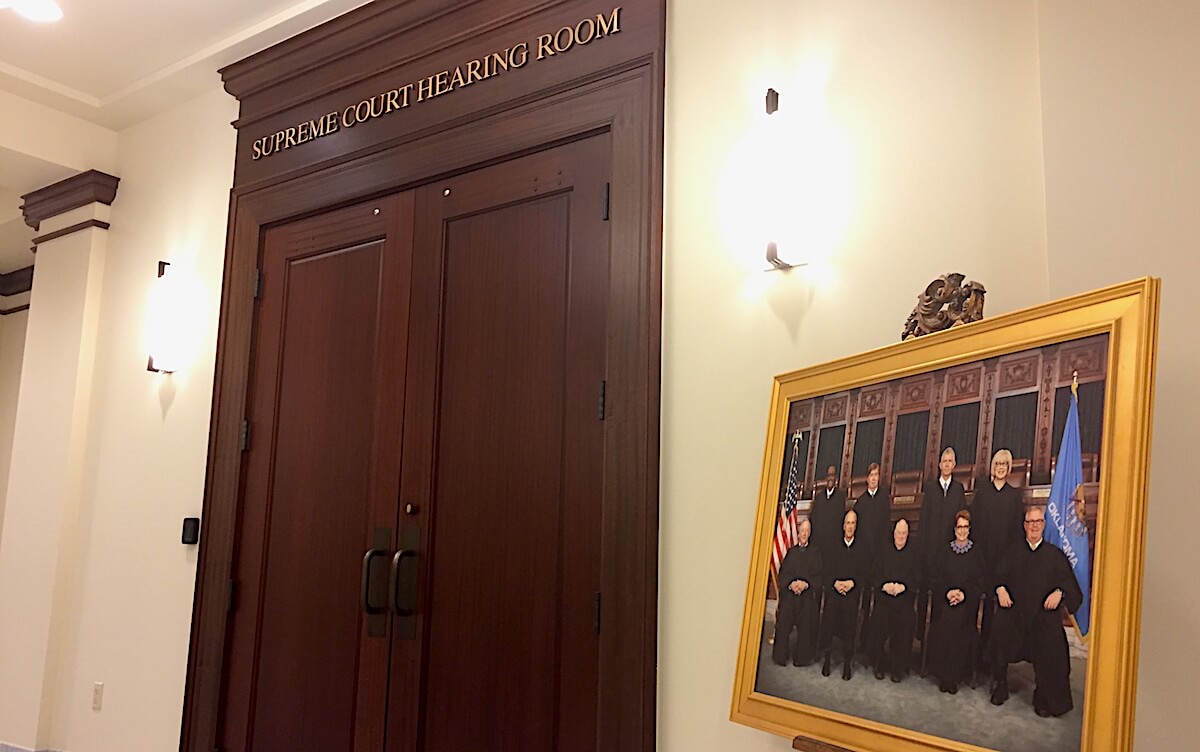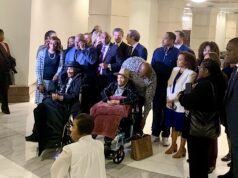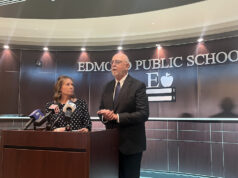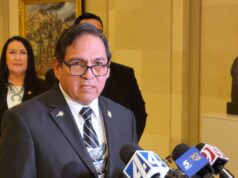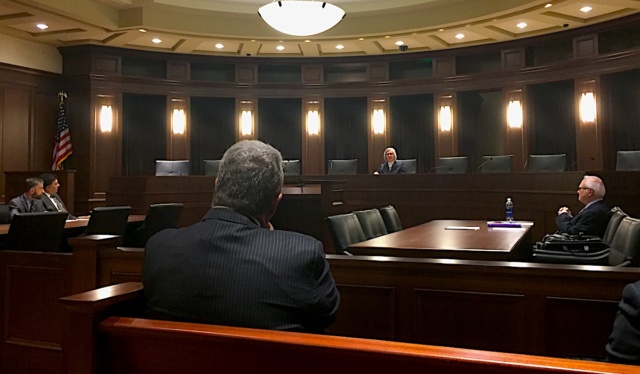
Referencing the dust bowl, Robert Redford and Leonardo DiCaprio, special assistant attorney general Neal Leader argued vociferously this morning that Oklahoma Supreme Court Justice Patrick Wyrick’s appointment cannot be challenged and that he is eligible anyway even if it can be.
“This case, we have Justice Wyrick as the main respondent. But this is also an attack on the Judicial Nominating Commission, its process, its powers and the finality of its controlling decisions,” Leader said. “The constitution thus forbids anyone — not the Legislature, not the courts, not the electorate — to take part in this selection process.”
Employing a stereotypical redneck accent for emphasis, Leader said lawyers often complain about court decisions. Minutes later, he critiqued the petitioners — Susan Spencer and Cheri Chandler of southeastern Oklahoma — and their counsel, the ACLU of Oklahoma.
“These people clearly have no standing,” Leader said. “The statute says so. This case was frivolously filed. This is not their finest hour (at the ACLU).”
He argued that only someone with competing title to the court appointment can challenge Wyrick’s seat.
Leader closed his remarks by waiving his hands in the air and quoting a fourth-grader in his daughter’s class as routinely saying, “Game over!”
Case called ‘frivolous,’ ACLU disagrees
The challenge to Wyrick’s eligibility, filed Feb. 14, argues that Wyrick had not been a qualified elector or bona fide resident for at least one preceding year in the state’s second Supreme Court district, which spans southeastern Oklahoma. That requirement is enumerated in the Oklahoma Constitution, petitioners argue, but Leader called the challenge “frivolous” Wednesday.
“Unlike the respondent, we don’t view enforcing the state constitution as frivolous,” ACLU of Oklahoma legal director Brady Henderson argued. “We don’t view asking a justice on the Supreme Court to follow the state constitution to be frivolous.”
After the oral hearing in front of referee Barbara Swimley, ACLU of Oklahoma executive director Ryan Kiesel took issue with Leader’s claim the case is frivolous.
“The idea that our case and the clients that we represent from the second judicial district have done something frivolous here is a dangerous line in the sand, and I would ask Neal Leader to reconsider that accusation he has made to the court,” Kiesel said. “The very fact that there may be some unresolved questions of law here argues entirely against the idea that this is a frivolous case.”
‘All-powerful status’
Henderson made the ACLU’s entire argument in the courtroom, however, and he dismissed Leader’s notion that the JNC should be above challenge.
“The JNC is not an unreviewable body. Period,” Henderson said. “There is nothing to suggest that in the Constitution. It does not grant all-powerful status to anyone.”
RELATED
ACLU files challenge to Wyrick’s Supreme Court appointment by William W. Savage III
Henderson opened the hearing by arguing that the court can review Wyrick’s eligibility as either quo warranto relief to petitioners or a writ of prohibition.
“There is a wrong here. There is a public interest wrong. Whether we right it through quo warranto, whether we right it through a writ of prohibition, there are remedies there that not only allow us to right that wrong, but mandate (that we do),” Henderson said. “Whichever writ we use, at the point at which we get to the facts, the facts will very clearly show a lack of qualified-elector status for a year.”
If the court finds that petitioners have standing in either of those manners, Wyrick’s residency will lie at the heart of the case. The second judicial district encompasses southeastern Oklahoma, where Wyrick grew up.
Henderson argued that Wyrick’s own answers on the JNC application said he has not lived in Atoka for at least 10 years.
“It lists him as a resident of Oklahoma City at the same time he claims to be a resident of Atoka,” Henderson said. “That’s not possible. This court over and over and over has held that a person — a natural person, at least, not a corporation — has but one residence.
“There are other public-record documents that can be brought in without much issue of authentication, I believe, without much issue of testimony that actually corroborate petitioners’ view here.”
Henderson referred to voter registration documents obtained by the ACLU.
“(There are) several instances where respondent registers to vote swearing under oath that he is a resident of Cleveland County and voting several times in Cleveland County as a sworn, bona fide resident thereof,” Henderson said. “All those statements made under oath, under the penalty of perjury. That’s fundamentally the problem as petitioners see it.”
‘Branded into his heart and soul’
Leader pushed back when it was his turn to talk.
“The notion that there’s a conflict on the statements on the application is absolutely, completely, 100 percent false,” Leader said. “Atoka and the country around it is branded into his heart and soul.”
RELATED
Wyrick attorney’s response: Lawsuit on Supreme Court appointment ‘frivolous’ by William W. Savage III
On the topic of standing, he also argued that Henderson’s discussion of a writ of prohibition is the same as quo warranto relief.
“You can put lipstick on it, you can put a funny hat on it, but it’s still quo warranto,” Leader said.
To that end, he concluded by emphasizing his belief that the JNC’s actions cannot be challenged.
“The game was over when the Judicial Nominating Commission made its decision,” Leader said.
The entire proceeding lasted about 50 minutes, and Swimley explained to about 25 people in the audience that her role is to report Wednesday’s hearing to the Oklahoma Supreme Court justices, at which point they will decide if and how to move forward with the case.
(Update: This story was updated at 1:28 p.m. Wednesday, March 1, to clarify part of Neal Leader’s argument. It was updated later in the day to correct the spelling of Mr. Leader’s first name. NonDoc regrets the error.)










